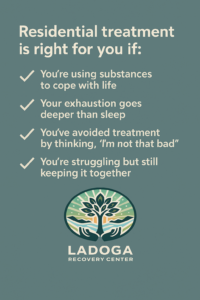There’s a kind of exhaustion that doesn’t show up on the outside. You’re showing up to work, making dinner, returning texts, maybe even cracking jokes about your “drinking problem”—but underneath, something’s not right. You’re tired. Not just physically, but emotionally. The kind of tired that comes from holding your life together with duct tape and denial.
For high-functioning addicts, the idea of “residential treatment” often feels like overkill. Like it’s meant for people who’ve lost everything—not someone who’s still employed, still parenting, still showing up.
But that belief? It’s not just wrong—it’s risky.
Residential treatment isn’t extreme. It’s not a punishment. It’s a safe, intentional reset that many high-functioning people quietly choose before the bottom drops out.
What Is Residential Treatment, Really?
Let’s clear up the biggest misconception first: residential treatment isn’t a locked facility or a scary hospital wing. It’s a place where people live temporarily—usually 30 to 90 days—while receiving structured, round-the-clock care and support.
At Ladoga Recovery Center in Indiana, our residential program is warm, human, and rooted in dignity. It includes:
- A safe, private place to stay
- Evidence-based therapies like CBT, DBT, and trauma-informed care
- Medical support if detox is needed
- Group sessions, peer connection, and holistic activities
- Daily routines designed to rebuild mental and physical stability
You don’t lose your freedom—you regain your clarity.
The Hidden Cost of “Functioning”
Here’s the catch: high-functioning addiction is still addiction. The consequences may be quieter, but they’re still there.
- You’re more irritable than you used to be
- Sleep is a mess, even when you’re exhausted
- Anxiety feels louder, harder to shut off
- The guilt after using doesn’t fade like it used to
- You plan your days around when and how you can use without getting caught
If that feels familiar, it’s not because you’re weak. It’s because substance use—no matter how “in control” it looks—comes with a cost. You’re not broken. But you might be carrying more than you need to alone.
Residential treatment offers space to breathe. To stop hiding. To sort out what’s going on without having to pretend you’re fine.

“I’m Not That Bad” Thinking Can Delay Real Help
A lot of people don’t seek treatment because they’re comparing themselves to someone worse.
But the standard isn’t, “Are you the worst case we’ve ever seen?”
It’s: “Could you be doing better with help?”
If you’re drinking or using just to sleep, just to feel normal, just to cope—that’s enough. You don’t have to fall apart to get support. You can decide to stop the slide while your life is still intact.
Think of residential treatment not as the last step—but the first safe one.
Why Residential Treatment Is Safer Than Managing Alone
Let’s be real: managing this alone can work for a while. But it’s like driving a car on a slow leak—you can still go fast, but you’re headed for a flat.
Residential treatment protects you from:
- Environmental triggers — no more navigating the liquor aisle or social expectations
- Emotional buildup — space to actually feel without crashing
- The secrecy cycle — no more lying to your spouse or pretending at work
- Medical risks — for those using daily, withdrawal can be dangerous without support
Choosing treatment isn’t waving a white flag. It’s putting up a safety net.
And when you enter care early—before the health, legal, or relational fallout—you give yourself a shot at full recovery with fewer scars.
What Makes Residential Treatment at Ladoga Unique?
Our program at Ladoga Recovery Center is designed with high-functioning clients in mind. We understand that you may be a business owner, a parent, a caregiver, or all three. You need respect, privacy, and a treatment plan that honors your intelligence and pace.
You’ll find:
- Flexible, co-created treatment plans
- Staff trained in working with professionals and caregivers
- A calm, judgment-free atmosphere
- A program tailored for your level of need
And importantly, we never shame clients for not “hitting bottom.” We celebrate the wisdom it takes to ask for help early.
FAQ: Residential Treatment for High-Functioning Clients
Do I have to quit my job to enter residential treatment?
In most cases, yes—residential treatment requires full-time participation. But many professionals use FMLA or PTO to protect their employment during care. Our staff can help you navigate this process confidentially.
What if I don’t feel “addicted”—just stuck?
You don’t need to identify with the word “addict” to deserve support. If you’re using substances to cope and it’s not working anymore, that’s enough of a reason to explore care.
Will people find out I’m in treatment?
Privacy is a cornerstone of care at Ladoga. We follow all HIPAA regulations and offer discreet admission processes for clients concerned about confidentiality.
Is residential treatment covered by insurance?
Often, yes. Many private insurance plans cover residential treatment. Our admissions team can verify your benefits and explain any out-of-pocket costs.
What happens after residential treatment ends?
Recovery doesn’t stop when residential care ends. We help you build a step-down plan that may include outpatient treatment, therapy, or sober living. The goal is continuity—not chaos.
You Don’t Have to Wait Until You Break
You don’t have to wait until the wheels fall off. You don’t need a rock bottom moment or a dramatic breakdown. You just need a moment of clarity—and a place safe enough to follow it.
Choosing residential treatment isn’t about giving up your life. It’s about getting it back.
You’re allowed to be tired. You’re allowed to want peace. And you’re absolutely allowed to ask for more than just survival.
Let’s Talk—Confidentially, Compassionately, Now
If this blog spoke to you, there’s a reason. You’re not weak. You’re not alone. And you’re not “too early” to need real support.
Call Ladoga Recovery Center today at (844) 628-6202 or learn more about our residential program in Indiana. We’ll walk you through your options, answer your questions, and help you find your next step—on your terms.
You’ve been strong long enough. Let this be the moment you get safe, supported, and seen.

